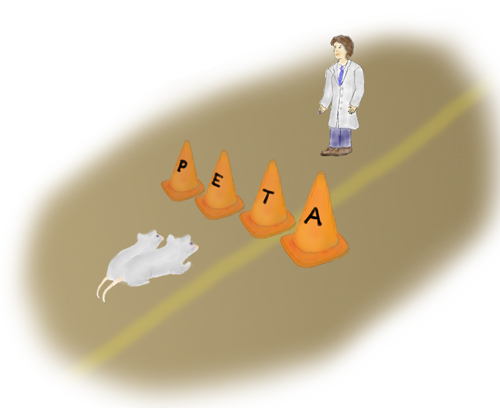By advocating the abolishment of research on animals, you’re actively standing in the way of a future cure for childhood blindness, Parkinson’s disease and Alzheimer’s disease.
Most animal rights groups advocate for research on animals to stop altogether but do not consider what that would actually do to science.
People for the Ethical Treatment of Animals, a group known for its controversial campaigns, is “unequivocally opposed to animal research,” according to Justin Goodman, research associate supervisor at PETA.
Goodman added that “animal experimentation is not valid science.”
While an ethical stance is hard to prove incorrect, Goodman’s statement about the scientific validity of animal experimentation is quite unfounded.
UCLA alone has made undeniably significant scientific advancements using animals in research.
UCLA scientists have developed a drug to reduce the side effects of cancer treatments using laboratory mice.
In another lab, a UCLA researcher, using rodent models, discovered new technology to help detect Alzheimer’s disease, Huntington’s disease and cancer.
Other medical breakthroughs at UCLA that involved research on animals include: the development of an artificial heart (various animals), a potential new schizophrenia treatment (primates), a possible new heart valve surgery for children (pigs), a treatment for Parkinson’s disease tremors (various animals) and a vaccine for tuberculosis (guinea pigs).
According to the Web site of Pro-Test, a group at UCLA that advocates education about the benefits of animal research, over 70 percent of Nobel Prizes in Physiology or Medicine have gone to those who have used animals in research. I would say that proves that animal testing is valid science.
Most animal rights groups want the abolishment of animal research because, they argue, animals are not treated well.
Goodman said that what scientists are doing is “imprisoning, mutilating and is not just cruel, it’s wrong.”
PETA currently has a campaign in which representatives are visiting universities to protest researchers who use animals.
While at UCLA last quarter, they handed out fliers that described what sounds eerily similar to a lab headed by Dr. Joaquin Fuster, a notable researcher who uses primates in his lab and is credited with finding the first memory cells in primates.
Dr. Fuster, who has been doing research with primates for 50 years, said, “We have to treat (the primates) well. Not only because it’s the right thing to do, if you’re a sensible human being and love animals as I do, but because it’s scientifically cost-effective.”
Dr. Fuster said that he has a motto that is included on every grant application: “Only happy animals give good data.”
In fact, all UCLA researchers are held to animal care standards of the Animal Welfare Act, U.S. Department of Agriculture and National Institute of Health, as is required by law and grant requirements.
In fact, UCLA voluntarily complies with the standards of the Association for Assessment and Accreditation of Laboratory Animal Care, whose accreditation is considered the highest in the field, according to Dr. J. David Jentsch, a UCLA researcher of drug addiction.
While the Animal Welfare Act does not cover all animals, a qualm of animal rights advocates, the rules set by the National Institute of Health and the Association for Assessment and Accreditation of Laboratory Animal Care cover those animals, and everyone at UCLA is held to those standards, added Dr. Jentsch.
So, basically, there’s no real argument against animal research at UCLA.
In fact, to make a logical argument for stopping animal research without being a hypocrite, one would have to elect to never have surgery, not use vaccines or medications and not take advantage of modern medical breakthroughs because most of those have come from animal research.
Instead of partaking in animal rights terrorism or calling for the total end of animal research, animal rights groups should spend their energy advocating for the widening of the Animal Welfare Act to include all animals.
Ashley Smith, president of Bruins for Animals!, said that her group is doing just that. According to Smith, they’re not looking for drastic changes, just the next steps in widening the definition of the Animal Welfare Act.
While this would not affect researchers at UCLA because they are all held to the highest of voluntary standards, it would raise standards for many other labs, a welcome change at labs that are not accredited by the Association for Assessment and Accreditation of Laboratory Animal Care.
Dr. Jentsch, who has had his car bombed by animal rights terrorists and founded Pro-Test, said, “I’m fine with regulations if they clearly improve welfare of animals.”
He also said that while he disagrees with the ultimate view of Bruins for Animals!, he thinks they are doing the right thing by being against terrorism and advocating for widened legislation.
If animal rights groups actually care for the rights of animals, they should advocate for all labs to be legally required to have the Association for Assessment and Accreditation of Laboratory Animal Care accreditation because that is a realistic goal that would actually improve animal welfare.
Calling for the end of all research on animals is too drastic and would be a detriment to society.
Does this column make you want to work for PETA now?
E-mail Ramzanali at aramzanali@media.ucla.edu. Send general comments to viewpoint@media.ucla.edu.
